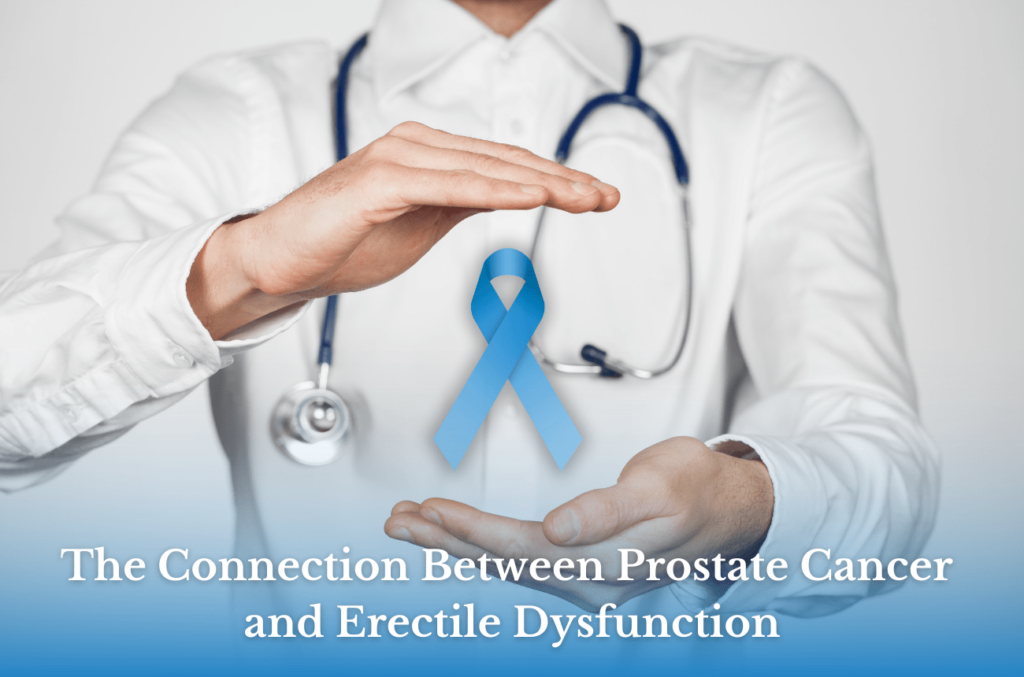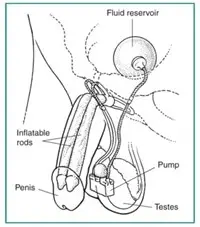Understanding Erectile Dysfunction Causes, Symptoms, and Treatment Options

Erectile dysfunction (ED) is a common condition that affects a man’s ability to get or maintain an erection for sexual activity. An estimated 30 million men in the United States suffer from some degree of ED. Understanding the causes, symptoms, diagnosis, and treatment options for ED is important for any man experiencing this condition.
What is Erectile Dysfunction?
Erectile dysfunction refers to the inability to get or maintain an erection firm enough for sexual intercourse. There are varying degrees of ED — some men are completely unable to get an erection, while others can only get partially hard or are unable to sustain their erection.
The Erection Process
Getting an erection is a complex process that involves the brain, hormones, nerves, emotions, and blood vessels. When a man becomes aroused, signals are sent to the penis to relax muscle tissue and increase blood flow. As more blood flows in, pressure traps the blood in the corpora cavernosa to make the penis rigid. If there are disruptions at any point in this process, ED can occur.
Symptoms of ED
The primary symptom of erectile dysfunction is being unable to get or keep an erection firm enough for satisfying sexual activity. You may struggle to get an erection at all, or lose your erection during sexual intercourse before you or your partner reach orgasm.
ED symptoms can occur at any age, but are more common in men over 40 years old. The symptoms may get worse over years if untreated. In some cases, ED is a symptom of an underlying health condition that needs treatment.
Causes of Erectile Dysfunction
There are a variety of potential causes for erectile dysfunction, including:
Physical Causes
- Cardiovascular disease
- Diabetes
- Obesity
- Metabolic syndrome
- Multiple sclerosis
- Parkinson’s disease
- Alcoholism or substance abuse
- Injuries or surgery that affect the pelvic area or spinal cord
- Radiation therapy to the pelvic region
Medications
- Blood pressure medications
- Antidepressants
- Antihistamines
- Chemotherapy drugs
- Antiandrogens or steroids
Psychological Causes
- Performance anxiety
- Stress
- Depression
- Relationship problems or lack of attraction to partner
Lifestyle Factors
- Smoking
- Lack of exercise
- Poor diet and nutrition
In some cases, ED has no known cause. But identifying and addressing the underlying reason can help resolve ED in many situations.
Symptoms of Erectile Dysfunction
Some common signs and symptoms of erectile dysfunction include:
Inability to Get an Erection
- Not being able to get an erection at all
- Struggling to get hard even when aroused
- Taking much longer to get an erection
Losing Erections Prematurely
- Erections not lasting long enough for intercourse
- Losing erection before or soon after penetration
- Erection is too soft for penetration
Reduced Sexual Desire
- Decrease in libido or interest in sex
- No longer finding partner or activity arousing
- Loss of spontaneous erections
In milder cases, a man may be able to achieve a partial erection but not sustain it long enough for sex. Other symptoms can include reduced girth or rigidity of erections. Determining the specific symptoms can help diagnose the cause and severity of erectile dysfunction.
Diagnosis of Erectile Dysfunction
Getting an accurate diagnosis is an important first step in treating erectile dysfunction. Diagnosis typically involves:
Physical Exam and Medical History
A doctor will ask about symptoms, medical conditions, medications, and lifestyle factors. A physical exam checks for signs of underlying conditions causing ED.
Blood Tests
Blood tests can check testosterone levels and health markers like cholesterol and blood sugar to assess the risk for conditions like heart disease or diabetes.
Urine Tests
A urine test can check for problems with erection-related hormones.
Psychological Exam
A mental health professional may assess for anxiety, depression, stress or other psychological factors.
Specialized Testing
Specialized tests can check whether ED is tied to circulation, nerve, anatomy issues or tissue scarring. These include:
- Nocturnal penile tumescence (NPT) testing
- Ultrasound
- Arteriography
- Bulbocavernosus reflex test
- Penile biothesiometry
Getting a full workup allows doctors to identify or rule out underlying causes for informed treatment planning.
Treatment Options for Erectile Dysfunction
A variety of medical, mechanical, and lifestyle treatments are available for managing erectile dysfunction:
Oral Medications
Medications like sildenafil (Viagra), tadalafil (Cialis), vardenafil (Levitra) relax muscles and improve blood flow for erections. They are effective for many men and can be used as needed before sex.
Injections and Suppositories
Alprostadil injections or suppositories relax muscles and increase blood flow to the penis. While effective, they must be administered shortly before intercourse.
Vacuum Erection Devices
These use vacuum pressure to pull blood into the penis and cause an erection. A tension ring can help maintain the erection. Though noninvasive, they require use immediately before sex.
Penile Implants
Surgically implanted devices (prosthetics) allow men to manually control the firmness of their erection. While invasive, implants have high patient satisfaction rates.
Psychological Counseling
Counseling with a mental health professional can help with stress, performance anxiety, depression or relationship issues contributing to ED.
There are also some natural and lifestyle remedies that may help manage milder cases of ED.
Natural Remedies for Erectile Dysfunction
Some natural options thought to help improve ED include:
Herbal Supplements and Vitamins
- Panax ginseng
- L-arginine
- Propionyl-L-carnitine
- Zinc
- Vitamin D
- Ginkgo biloba
However, more research is still needed on their efficacy and safety for ED. It’s best to discuss natural supplements with a doctor before taking them.
Healthy Lifestyle Changes
- Losing weight
- Quitting smoking
- Reducing alcohol intake
- Eating a nutritious diet
- Getting regular exercise
While not direct treatments, healthy lifestyle changes can often resolve ED tied to underlying health conditions.
Preventing Erectile Dysfunction
While not always possible to prevent, some key ways to help reduce the risk for ED include:
Managing Chronic Health Conditions
Properly managing illnesses like diabetes, heart disease and obesity can help prevent the vascular causes of ED.
Limiting Medications
Discuss alternatives to medications linked to ED like blood pressure drugs, antihistamines or antidepressants.
Reducing Stress
Find healthy stress relief techniques like exercise, meditation or speaking with a therapist. This can prevent anxiety and depression from progressing.
Making Healthy Lifestyle Choices
Quit smoking, avoid excessive drinking, use illicit drugs in moderation, and strive to stay physically active to maximize sexual health.
Catching and addressing health issues early on can help ward off ED down the line.
Introduction to Natural Drinks for Erectile Dysfunction
Certain lifestyle changes and home remedies may help manage ED tied to restricted blood flow or nervous system issues:
Pelvic Floor Exercises
Strengthening pelvic floor muscles can give more control over erections and ejaculation. Known as Kegel exercises, they also promote circulation.
Losing Weight
Extra weight strains blood vessels and may contribute to vascular causes of ED. Losing excess pounds can relieve pressure.
Limiting Alcohol
Drinking too much depresses the nervous system and inhibits arousal signals needed for erections. Cutting down may help optimize sexual function.
Stopping Smoking
Smoking narrows blood vessels essential for erections. Quitting can rapidly boost circulation crucial for firm erections.
While not cure-alls, lifestyle changes like these can often provide modest improvements in mild ED by targeting underlying causes.
Talking to Your Partner About Erectile Dysfunction
Having open, honest conversations with your partner about erectile dysfunction is critical for a healthy, understanding relationship:
Be Open About Your Symptoms
Clearly communicate when you have trouble getting or maintaining an erection so your partner understands it’s not them. Hiding symptoms can hurt your sex life and relationship.
Make Reassurances
Reassure your partner that ED is common and treatable, and not a reflection on them or your attraction to them. Communicate that you still desire intimacy.
Discuss Ways to Be Intimate
Talk about other ways to connect physically and emotionally like touching, kissing or cuddling. Don’t make penetration the only definition of sex.
Seek Medical Attention
Let your partner know you take this seriously and will be seeking medical advice so you can get back to a fulfilling sex life together.
Having open conversations reduces worry and reassures your partner so you can work through ED challenges cooperatively.
Support and Resources for Erectile Dysfunction
A variety of helpful resources exist for dealing with erectile dysfunction:
Talk to Your Doctor
Speaking with your doctor is key for getting to the root of what’s causing ED and exploring medical treatment options best suited for you.
Consider Counseling
Seeing a counselor can help manage stress or work through relationship problems that may be worsening ED.
Join Support Groups
In-person or online support groups allow you to share experiences and advice for coping with ED.
Read Educational Material
Books, websites and blogs offer science-based education on ED causes, treatments and healthy lifestyle changes to try.
Contact Advocacy Groups
Reputable organizations like the Sexual Medicine Society of North America provide patient resources and connect people to help.
Reaching out for professional support and shared wisdom from others experiencing ED can go a long way in overcoming challenges. You don’t have to go through this alone.
Conclusion
Erectile dysfunction is a common condition affecting millions of men that should not be ignored. While it may cause embarrassment, there are now more treatment options available than ever before. Identifying the underlying cause and consulting your doctor for proper diagnosis is key in developing an effective treatment plan. With today’s therapies, open communication with your partner, and helpful support resources, most men find they can successfully overcome erectile dysfunction challenges.













